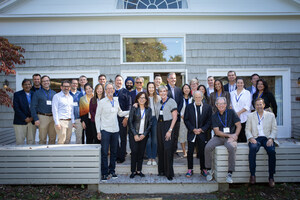
WOODBURY, N.Y., May 15, 2019 /PRNewswire/ -- Lustgarten Foundation funded researchers at Johns Hopkins University have released promising results showing that computers can be trained to detect pancreatic tumors in CT scans, as reported in the American Journal of Roentgenology.
CT is the most commonly used imaging modality for the initial evaluation of suspected pancreatic ductal adenocarcinoma (PDAC). PDAC can be subtle and missed by even experienced radiologists. In order to improve the rate and accuracy of detection, the Lustgarten Foundation has funded research in artificial intelligence, with the goal of using machines to help detect pancreatic cancer earlier. Under the guidance of Elliot Fishman, M.D., Professor of Radiology and Radiological Science, and Alan Yuille, Ph.D., Professor of Cognitive Science and Computer Science, both at Johns Hopkins, this project uses sophisticated computer programs that teach themselves to read CT scans. This field of study, called radiomics, aims to extract many quantitative features from medical images using data-characterization algorithms, with the goal of identifying characteristics of the disease that are missed by the naked eye.
One of the biggest challenges is simply getting the computer to recognize a healthy pancreas versus a pancreatic tumor. In this retrospective case-control study, all PDAC cases (60/60) were correctly classified and differentiated from normal pancreases. The sensitivity was 100%, and specificity was 98.5%. Sensitivity and specificity are terms used to evaluate a clinical test. Sensitivity is the ability of a test to correctly identify those with the disease (true positive), whereas test specificity is the ability of the test to correctly identify those without the disease (true negative).
"This work demonstrates that radiomics features extracted from the whole pancreas can be used to differentiate between CT cases from patients with PDAC and healthy control subjects," said Dr. Fishman.
"The results are very encouraging," said David Tuveson, M.D., Ph.D., Lustgarten's Chief Scientist and Director of the Cancer Center at Cold Spring Harbor Laboratory. "It reinforces that we are on the right track. The goal of this research is for computers to be trained to look for any slight abnormality within the pancreas before radiologists would consider this to be a worrisome finding. This could result in earlier detection of pancreatic tumors, as well as improve the number of accurate diagnoses so that the proper care can be initiated sooner."
"Years from now, deaths from pancreatic cancer will be a lot less common, and that's going to be in large part due to earlier detection," said Bert Vogelstein, M.D., Director of the Lustgarten Lab at the Johns Hopkins Kimmel Cancer Center.
About Lustgarten Foundation
Lustgarten Foundation is the largest private funder of pancreatic cancer research in the world. Based in Woodbury, N.Y., the Foundation supports research to find a cure for pancreatic cancer, facilitates dialogue within the medical and scientific community, and educates the public about the disease through awareness campaigns and fundraising events. Since its inception, Lustgarten Foundation has directed $165 million to research and assembled the best scientific minds with the hope that one day, a cure can be found. Thanks to separate funding to support administrative expenses, 100% of your donation goes directly to pancreatic cancer research. For more information, visit www.lustgarten.org.
SOURCE Lustgarten Foundation








Share this article